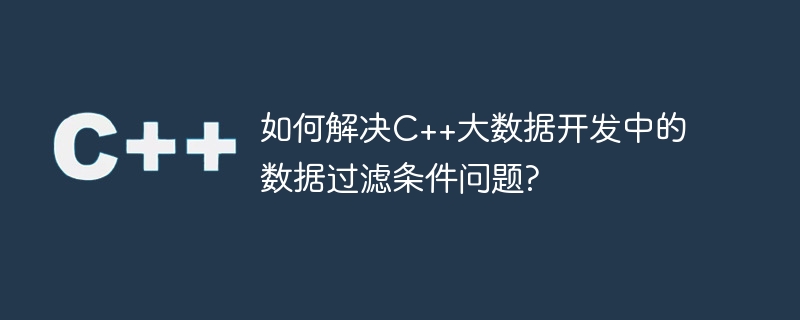

How to solve the problem of data filtering conditions in C big data development?
Abstract:
Data processing is one of the core tasks in big data development, and Data filtering is a key link in data processing. This article will introduce how to solve the problem of data filtering conditions in C big data development and provide code examples.
Introduction:
In big data development, we often need to screen and filter huge data sets to meet specific conditions. The issue of data filtering conditions is an important challenge in this process. This article will introduce commonly used technologies and methods in C language to help readers solve the problem of data filtering conditions.
1. Use standard library functions
C standard library provides multiple functions to implement data filtering conditions. The most commonly used ones are std::find_if and std::copy_if. The std::find_if function accepts a callable object as a parameter to determine whether the specified condition is met; the std::copy_if function copies elements that meet the condition to another container. The following is a sample code:
#include <iostream>
#include <vector>
#include <algorithm>
// 过滤函数
bool isOdd(int n) {
return n % 2 != 0;
}
int main() {
std::vector<int> numbers = {1, 2, 3, 4, 5, 6, 7, 8, 9, 10};
std::vector<int> oddNumbers;
// 使用std::copy_if过滤满足条件的元素
std::copy_if(numbers.begin(), numbers.end(), std::back_inserter(oddNumbers), isOdd);
// 输出结果
for (int num : oddNumbers) {
std::cout << num << " ";
}
std::cout << std::endl;
return 0;
}In the above example, we defined a filter function isOdd to determine whether an integer is odd. Then use the std::copy_if function to copy the odd numbers that meet the conditions into the oddNumbers container and output it.
2. Use Lambda expressions
C 11 introduces Lambda expressions, which can implement data filtering conditions more concisely. Lambda expression is an anonymous function that can be defined directly in the function without naming it separately. The following is a sample code that uses Lambda expressions to solve the problem of data filtering conditions:
#include <iostream>
#include <vector>
#include <algorithm>
int main() {
std::vector<int> numbers = {1, 2, 3, 4, 5, 6, 7, 8, 9, 10};
std::vector<int> oddNumbers;
// 使用Lambda表达式过滤满足条件的元素
std::copy_if(numbers.begin(), numbers.end(), std::back_inserter(oddNumbers),
[](int n) { return n % 2 != 0; });
// 输出结果
for (int num : oddNumbers) {
std::cout << num << " ";
}
std::cout << std::endl;
return 0;
}In the above code, we use Lambda expressions to replace the previous filter function isOdd, making the code more concise.
3. Use custom function objects
In addition to Lambda expressions, custom function objects can also be used in C to complete data filtering conditions. A function object is a class that implements the function call operator operator() so that it can be called like a function. The following is an example code that uses a custom function object to solve the problem of data filtering conditions:
#include <iostream>
#include <vector>
#include <algorithm>
// 自定义函数对象
struct IsOdd {
bool operator()(int n) {
return n % 2 != 0;
}
};
int main() {
std::vector<int> numbers = {1, 2, 3, 4, 5, 6, 7, 8, 9, 10};
std::vector<int> oddNumbers;
// 使用自定义函数对象过滤满足条件的元素
std::copy_if(numbers.begin(), numbers.end(), std::back_inserter(oddNumbers), IsOdd());
// 输出结果
for (int num : oddNumbers) {
std::cout << num << " ";
}
std::cout << std::endl;
return 0;
}In the above example, we defined a function object named IsOdd and implemented the operator() function to determine whether an integer is odd number. Then use the function object to filter and output the results.
Conclusion:
This article introduces how to solve the problem of data filtering conditions in C big data development. By using standard library functions, lambda expressions, and custom function objects, we can filter and process large data sets based on specific conditions. Readers can choose the appropriate method according to their own needs and learn and practice it with sample code.
The above is the detailed content of How to solve the problem of data filtering conditions in C++ big data development?. For more information, please follow other related articles on the PHP Chinese website!
 What are the differences between c++ and c language
What are the differences between c++ and c language
 Recommended learning order for c++ and python
Recommended learning order for c++ and python
 Cost-effectiveness analysis of learning python and c++
Cost-effectiveness analysis of learning python and c++
 Is c language the same as c++?
Is c language the same as c++?
 Which is better to learn first, c language or c++?
Which is better to learn first, c language or c++?
 The difference and connection between c language and c++
The difference and connection between c language and c++
 C++ software Chinese change tutorial
C++ software Chinese change tutorial
 Cost-effectiveness analysis of learning python, java and c++
Cost-effectiveness analysis of learning python, java and c++




